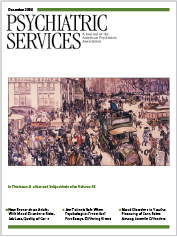Disparities in the Adequacy of Depression Treatment in the United States
Abstract
OBJECTIVE: There is evidence of disparities in depression treatment by factors such as age, race or ethnicity, and type of insurance. The purpose of this study was to assess whether observed disparities in treatment are due to differences in rates of treatment initiation or to differences in the quality of treatment once treatment has been initiated. METHODS: Logistic regression models using data from the 2000 Medical Expenditure Panel Survey were estimated to assess the role of age, race or ethnicity, and type of insurance on rates of initiation of depression treatment for persons with self-reported depression and on rates of adequate treatment for those receiving treatment. RESULTS: African Americans and Latinos were significantly less likely to fill an antidepressant prescription than Caucasians. However, among patients who filled at least one prescription for an antidepressant, there were no racial or ethnic disparities in the probability of receiving an adequate trial of antidepressant medication. African Americans were more likely than Latinos and Caucasians to receive an adequate course of psychotherapy. Persons who did not have insurance coverage were less likely to initiate any depression treatment compared with those who did have insurance. However, if treatment was initiated, no difference in the probability of receiving adequate treatment was observed. Elderly persons were less likely to receive an adequate course of psychotherapy or counseling compared with younger persons. CONCLUSIONS: Disparities in depression treatment appear to be due mainly to differences in rates of initiation of depression treatment, given that rates of adequate care generally did not differ once treatment was initiated.




